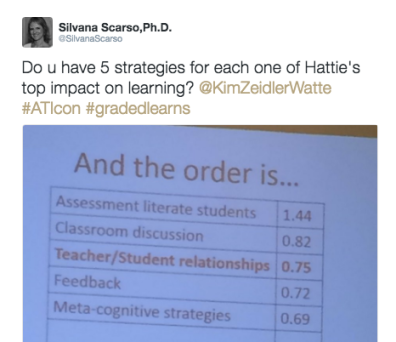Building Community to Develop Life Long Learners

We have been hearing about student-centred learning for quite some time now. It is a big idea with many nuances that we are slowly getting our heads around. Then the expression about students having ownership of their learning started to pop up all around. For me, that was a lot more specific, as it focused on the idea of students being the ones responsible for their learning, and the teachers being responsible for creating an environment where it could happen. So this Summer during the ATI Conference (Assessment Training Institute) I heard the term student agency, which gives us an even better idea of how students can be at the centre of learning. Below is a definition from 10 Tips for Developing Student Agency.
Agency is the capacity and propensity to take purposeful initiative—the opposite of helplessness. Young people with high levels of agency do not respond passively to their circumstances; they tend to seek meaning and act with purpose to achieve the conditions they desire in their own and others’ lives.
It was exciting for me to see a convergence between the idea of student agency and the idea of building community to foster resilience shared by Rachel Poliner during our Pre-Service workshop. She came to Graded School to help us with community building strategies so we can improve Middle School Advisory and start implementing strategies in the High School to ease our way into Advisory for that age group as well. her work is mostly based on brain research. At Resilience: The Other 21st Century Skills we can see a definition for resilience that seems like a perfect complement to student agency:
Resilience is the human capacity to face, overcome and ultimately be strengthened by life’s adversities and challenges. This is not something that people either have or do not – resilience is learnable and teachable and as we learn we increase the range of strategies available to us when things get difficult.
A crucial take-away from all these big ideas is that we need to develop a supportive and nurturing community so students can learn how to be resilient and be agents of their own learning. This is the only way to develop life long learners.

The importance of community building, not only in advisory but also inside the classrooms, can be seen in John Hattie’s newest research Hattie Ranking: 195 Influences And Effect Sizes Related to Student Achievement. Teacher/student relationship has high impact on student learning. If we unpack teacher/student connection we will see many facets, which are explored by Rachel Poliner as she provides communication strategies between teacher and student that foster resiliency, which includes student agency.

Here is a summary from Rachel Poliner’s workshop on Communication Skills that Foster Resilience.
- Listening: “pay attention to the speaker’s story … showing that you are listening via attentive silence, body language, short prompts for more of the story..”
- Asset-based feedback: “verbally acknowledging a quality of character”
- Evidence-based feedback: “asking questions or giving specific information or suggestions meant to support improvement”
- Appreciative inquiry: “approaching problem solving by starting with a success; prompting the student to recall when she/he had a positive experience on something related. ..analyzing the success to build on it… identifying and solving the hurdles”
- Boosting and encouraging: “showing faith in a student, encouraging them to have faith in themselves”
- Coaching: “using any of the skills above and others to help students break a big problem into chucks, prioritize their commitment, try out a solution”

Leave a Reply